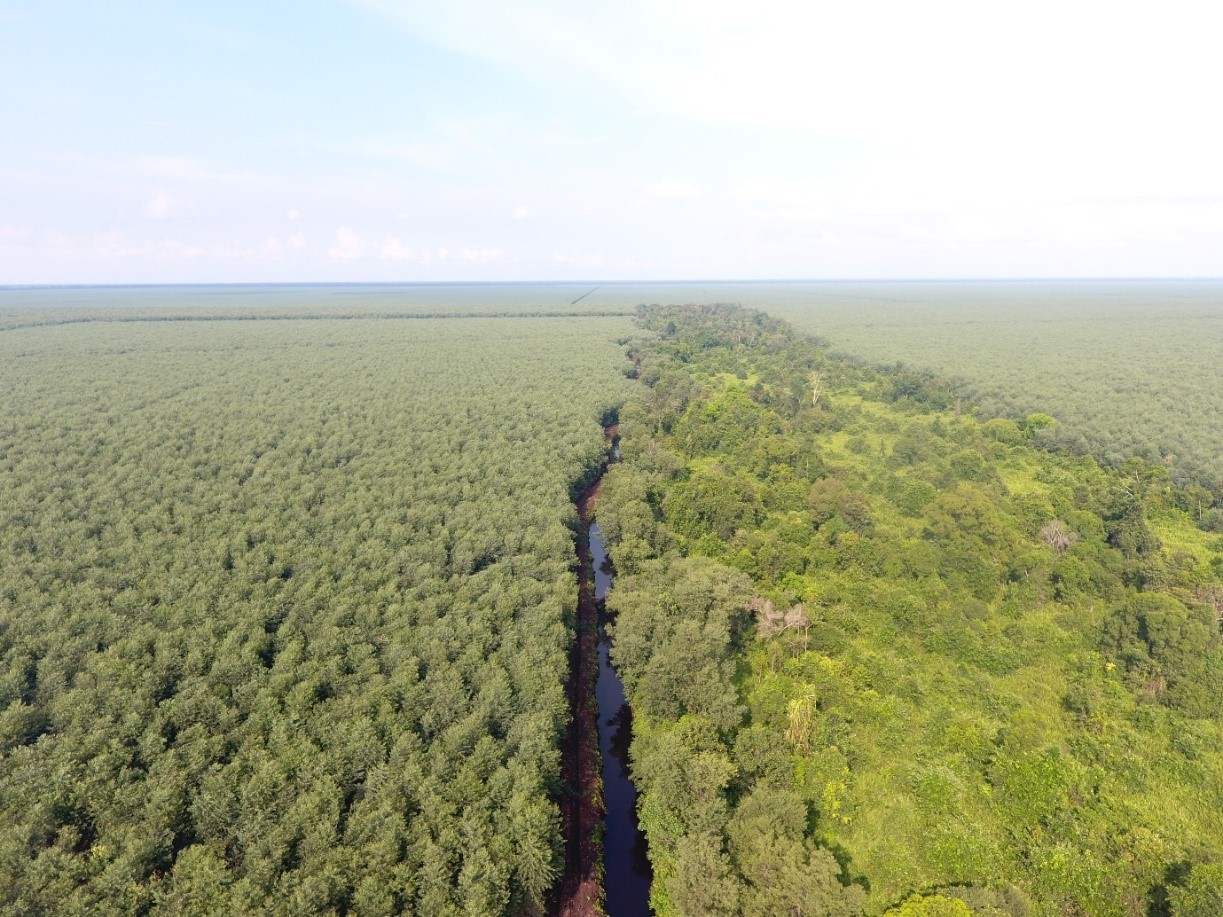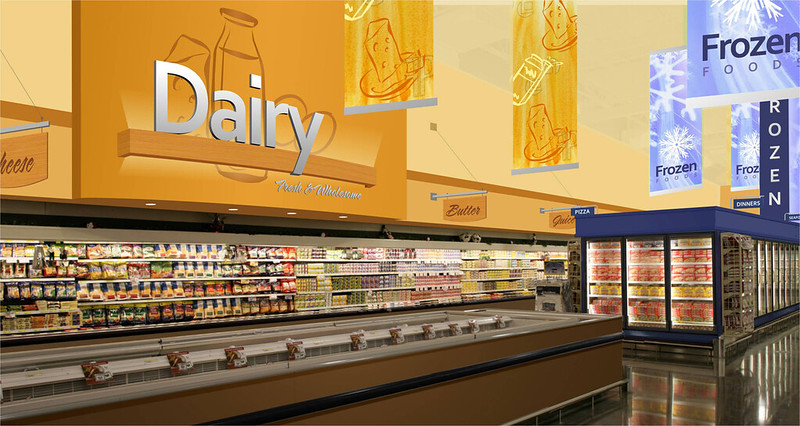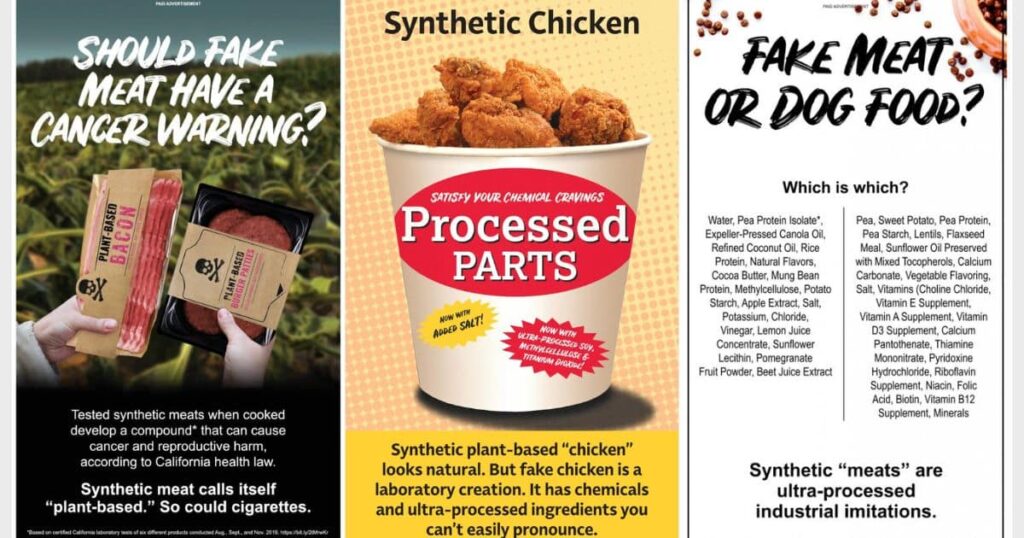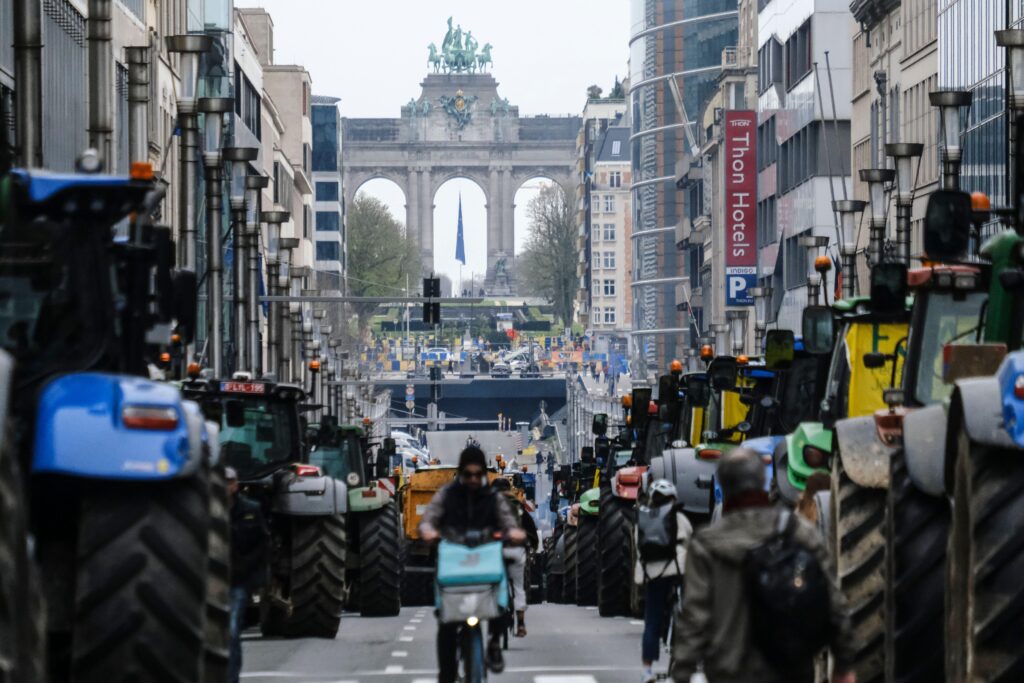Activists fighting deforestation in Indonesia have spoken out against calls from the packaging and fast food industry for paper-based packaging to be recognised as sustainable in EU law.
Household names such as McDonald’s, KFC and Dunkin’ Donuts are trying to delay new regulations that would prioritise reusable packaging – to curb plastic use, packaging waste and packaging-related emissions – arguing instead for single-use paper options.
But campaigners have said that those pushing for a switch to paper are ignoring the harmful impacts of paper production in their communities.
“Increasing the production of pulp and paper increases deforestation, fires, social conflict and conflict with wildlife,” said Okto Yugo Setiyo of Jikalahari, a coalition of NGOs and student groups in from the Indonesian province of Riau, a region of Sumatra that has seen massive deforestation.
Over the past 40 years, an area of Riau equivalent to more than one and a half times the landmass of Belgium has been deforested, according to satellite imagery analysed by the group.
Most paper used in Europe is currently sourced from within the EU. But advocacy organisations are concerned that a large-scale switch to paper-based packaging instead of plastic in the bloc will lead to greater imports from countries such as Indonesia in the Global South, where paper production trees grow much faster than in colder countries.
The European Commission launched its Packaging and Packaging Waste Regulations in November 2022. The draft law focuses on a switch to reuse across the EU, and sets reuse targets for the restaurant, takeaway, e-commerce and a number of other sectors. The legislation is currently being considered by the European Parliament and European Council.
The Commission’s proposals have been met with a barrage of lobbying from industry, which claims that single-use paper products have lower carbon emissions and use less water and plastic than reusable alternatives.
Companies and industry lobby groups – including soft drinks manufacturer Pepsico, chemical company Dow, and cosmetics brand L’Oreal – held over 290 official meetings with Members of European Parliament (MEPs) on the topic between January 2022 and early April 2023, compared to just 21 meetings held on the same topic by civil society groups.
“Many companies don’t want the kind of system change involved in switching to reuse,” said Hannah Mowat from Fern, an NGO that advocates for forests and forest people. “But paper packaging is not a sustainable alternative.”
“If you claim that paper is sustainable, you don’t know what is happening in Indonesia,” said Nurul Fitria, from Jikalihari, whose members visited Brussels last week to speak to policymakers about proposed laws. “Companies are able to cut down trees because of corruption. They are in conflict with local communities, they take their land. They cause huge fires.”
Expanding Paper Industry
Fast food and packaging companies have come together to call for paper-based packaging to be prioritised in EU laws.
Together for Sustainable Packaging – an alliance of fast food and packaging companies, including McDonald’s, Dunkin’ Donuts and KFC – wrote: “Recyclable fiber-based packaging has the greater potential [than reusable options] to benefit the environment, economy, food safety and consumers”, in a sponsored Politico article in April.
The trade association European Paper Packaging Alliance (EPPA) said: “Single use paper-packaging [is] Europe’s chance to meet its climate ambitions,” in a sponsored article in Euractiv in June 2022.
But campaigners warn that further expansion of the paper industry could lead to conversion of new forest areas. They say that growing demand could be met by increasing paper imports, with major consequences for ecosystems and communities in the Global South.
“Forests in many European countries are at intense harvesting levels. Some forests are now emitting more carbon dioxide than they’re absorbing, and some countries, such as Sweden, have had to react by slowing harvest levels,” said Hannah Mowat of Fern. “We’re worried about an increase in demand: where would the paper come from?”
Sergio Baffoni of the Environmental Paper Network – a coalition of over 200 civil society groups focused on the pulp and paper industry – agreed: “Growing demand in pulp means increasing global prices, which is leading to extensive investments in new pulp mills. The story of Indonesia could be seen in other parts of the world.”
Packaging accounts for half of the paper used in the EU. Demand for paper and cardboard has grown steadily over the last decade worldwide – and paper packaging waste in the EU has increased alongside.
Indonesia has faced massive deforestation in the last half century due primarily to palm oil plantations and logging. By the late 1990s, it was estimated that the country had lost 72 percent of its large, intact natural forests.
Pulp and paper trees are often grown on drained peatland, which is a massive carbon sink. When they are drained or degraded, CO2 is released into the atmosphere. In 2017, the Environmental Paper Network estimated that annual greenhouse gas emissions from peat oxidation caused by Indonesia’s pulp and paper sector were higher than the entire country emissions of Finland.
Activists also point out that plantation trees do not support wildlife – or people. “In the natural forests, there is wildlife, food from the trees, mushrooms, medicine, fruit. In the paper plantations, there is nothing,” Setiyo from Jikalihari said.
Fitria added that paper production had negatively impacted inhabitants of Pekanbaru, the capital city of Riau, around 100 kilometers from the plantation, where she lives. “The smoke haze from forest fires blows into the city. We cannot breathe freely. We’ve lost our health.”
The EU currently imports only negligible amounts of paper and pulp directly from Indonesia. However, Fern holds that there is a high risk of “Indonesian forest fibre finding its way onto the European market via bigger markets, such as China, India and Thailand”.
Pulp and paper production is expanding in Indonesia. Companies have recently started operations in the forests of West Papua, a disputed territory that has been occupied by Indonesia since 1963.
When approached for comment, Together for Sustainable Packaging told DeSmog that raw materials used for paper packaging by alliance members were certified under the Forest Stewardship Council (FSC) and Programme for the Endorsement of Forest Certification (PEFC) (two schemes that operate principles of responsible forest management and sustainability).
Contested Emissions and Recycled Data
Industry claims about the relative sustainability of paper packaging compared to reusable alternatives have focused on carbon emissions.
In recent months, McDonald’s and the trade body for the paper packaging industry, EPPA, have both funded “independent studies” that found that reusable packaging would lead to soaring emissions, plastic use and waste compared to paper options. The industry has funded a total of four such studies to date.
DeSmog reported in May, however, that academics and campaigners had criticised McDonald’s study for using flawed assumptions and a “disturbing” lack of transparency about the data behind calculations.
Members of the packaging and fast food industries have used the data in the studies to call for a pause to the proposed targets on reuse. They insist that paper-based products are a recyclable, “circular” alternative.
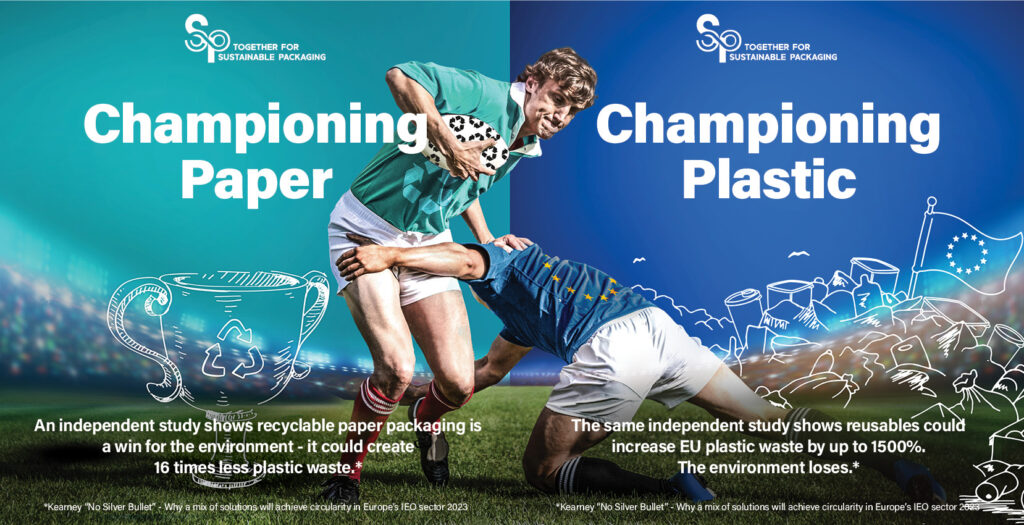
Consumer recycling rates for paper are high – around 70 percent – in the EU. But a smaller proportion of this is recycled in practice, particularly for food packaging, which is discarded if contaminated by grease or other residues. Paper cups and other items are often lined with plastic, a mixed material that is hard to recycle.
Even where recycled content is used for new material, virgin fibres are almost always needed for strength. As a result, recycled fibres only amount to 10 percent of the paper, wood and tissue used in the EU.
“If it was a truly circular system, we wouldn’t need to expand paper and pulp production. We would not need to cut three billion trees every year just to produce single-use packaging,” Baffoni of the Environmental Paper Network said. “But this is not the case.” Indonesia, he said, offered a warning against encouraging demand for paper production to grow.
“EU regulations on logging and deforestation will not be sufficient to stop the ever expanding production machine. The key is to turn the tide on consumption,” Baffoni said. “We see this legislation as a turning point – towards a solution, or towards catastrophe.”
EPPA, McDonald’s, KFC and Dunkin’ Donut were contacted for comment.
Subscribe to our newsletter
Stay up to date with DeSmog news and alerts


